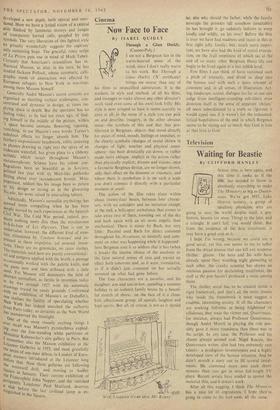Cinema
Now Face to Face
By ISABEL QUIGLY
I AM not a Bergman fan in the warm-hearted sense of the word, since I don't really warm to his work. But Through a Glass Darkly ('X' certificate) brings me nearer than any of his films to unqualified admiration. It is the starkest, in style- and method, of all his films, and manages to make almost any other director's work (and even some of his own) look frilly. His style is now scraped so bare it seems scarcely to exist at all, in the sense of a style you can pick on and describe; imagery, in the other obvious sense—the symbols of this and that that pro- liferated in Bergman, objects that stood directly for states of mind, moods, feelings or impulses, or the-clearly symbolic changes of mood shown in changes of light, weather and physical atmo- sphere--has been drastically cut down, or rather made more oblique, implicit in the action rather than physically explicit; dreams and visions, once a favourite Bergman device, are no longer shown, only their effect on the dreamer or visionary, and where there is symbolism it is on such a scale you don't connect it directly with a particular moment or event.
The action of the film takes place within about twenty-four hours, between four charac- ters, with no outsiders and no intrusion except, at the end, a helicopter ambulance that comes to take away two of them, zooming out of the sky and back again with an air more angelic than mechanical. There is music by Bach, but very little: Pasolini used Bach for direct comment throughout his Aceattone, ta intensify and com- ment on what was happening while it happened: here Bergman uses it so seldom that it has (when it breaks the intense silence of the seashore or the faint natural noises of rain and waves) an effect both sonorous and, as it were, cumulative, as if it didn't just comment on but actually summed up what had gone before.
The four characters are a novelist, and his daughter, son and son-in-law, spending a summer holiday in an isolated family house by a beauti- ful stretch of shore: on the face of it a close- knit, affectionate group, all squeals, laughter and high spirits. But all, of course, is not as it should
'Well, I suppose it's an idea, Mr. Kenny.'
be; else why should the father, while the family unwraps the presents (all somehow unsuitable) he has, brought it, go suddenly indoors to weep loudly and wildly, on his own? Before the film is over we have had madness and incest in this at first sight jolly family; but, much more impor- tant, we have also had the kind of moral evacua- tion, on the frail emptiness of which (as at the' end of so many other Bergman films) life can begin to be lived again at a less selfish level.
Few films I can think of have sustained such a pitch of intensity, and dived so deep into the human soul with such a spare amount of comment and, in all senses, of illustration. Act- ing, landscape, sound, dialogue (as far as one can judge from intelligent-sounding sub-titles), even direction itself in the sense of apparent 'choice.' all seem subordinated to a truth so rigorous it would appal one if it weren't for the exhausted, lyrical hopefulness of the end, in which Bergman seems to be saying not so much that God is love as that love is God.






































 Previous page
Previous page